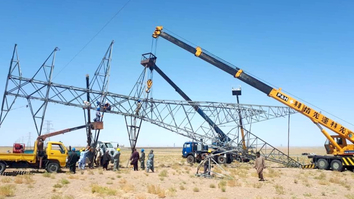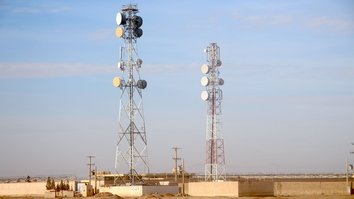HERAT -- The Taliban have destroyed more than 200 telecommunication towers over the past year, disrupting services for thousands of Afghans, the Afghanistan Telecom Regulatory Authority (ATRA) said.
In addition to disrupting telecommunication services, ATRA said, the Taliban's destruction has caused tens of millions of dollars in damage to private and public telecommunication carriers.
The insurgent group destroyed or set fire to more than 51 telecom sites in the past four months alone, ATRA spokesman Sayed Shinwari told Salaam Times.
Shinwari said ATRA is planning to rehabilitate damaged sites or build new ones to provide telecom services for those in the affected areas.
The Taliban's continued destruction of infrastructure projects such as roads, bridges, electricity pylons and telecom towers has aroused public anger.
The group also has destroyed schools and hospitals.
The Taliban have caused deep distress to the local population by destroying the telecom towers, said Herat city resident Parwaiz Rahimi.
"Everyone condemns the Taliban's destructive activities, especially its destruction of cell towers," he said, noting that this havoc affects the general public more than it does the government.
"The Taliban must drop their enmity toward our country's infrastructure," he said.
Telecom services cut
Through the destruction of telecom towers and other means, the Taliban have hindered the operation of telecom networks in most provinces.
The group has banned telecom carriers from operating during the night in Ghor province since June 25, said Sayed Mir Ghafoori, the ATRA director in Ghor.
The militants also shut down the services of private telecom carriers entirely for at least 15 days last month, Ghafoori said, adding that services resumed after tribal elders and ATRA authorities staged a mediation.
The Taliban have similarly restricted nighttime telecom networks in most other provinces, cutting off services to millions of inhabitants, he added.
The curtailment of telecom services across the country, particularly in Ghor, has caused widespread concern, according to Ghor resident Abdul Qudos Saqib.
"What do the Taliban seek to achieve by cutting off the operation of telecom networks?" he wondered, noting that the Taliban "have always created obstacles to Afghanistan's development and prosperity".
Firoz Koh resident Shafiqatullah Anwari also said he wonders why the Taliban are burning down "infidel" cell towers and disrupting telecom services.
In today's world, he said, telecommunication has become an integrated part of society, but the Taliban deliberately prevent Afghans from using such services.
The Taliban continue to shun the path of progress in pursuit of the path of destruction, blowing up roads, bridges, power lines and telecom towers, Anwari said.
Bringing destruction
Herat residents who spoke to Salaam Times pointed out that infrastructure projects -- including telecom networks -- belong to the Afghan people.
According to Herat city resident Ali Akbar Haidari, anyone who destroys cell towers and electricity pylons is indeed an enemy of the people and Afghanistan.
The Taliban claim they want to seize power in Afghanistan and create a government, but they have forgotten they destroyed all the infrastructure of the country and alienated the people with their violence, he said.
Destroying public infrastructure is against the principles of Islam and of humanity, said Herat city religious scholar Mawlawi Mohammad Sadiq Hanifi.
Telecom networks have facilitated communication among Afghans, he said, stressing that "no one has the right to disrupt or halt public services".
In targeting and destroying infrastructure projects, the Taliban are going against sharia, Hanifi said, noting that the Taliban must realise the path they are pursing is not in alignment with the values of Islam.
"The Taliban have no right to use the name of Islam to destroy infrastructure," he said.

![Cell phone towers can be seen in this photo taken January 30, 2019, in Zindajan district, Herat province. [Omar/Salaam Times]](/cnmi_st/images/2021/07/20/30808-a_3-585_329.jpg)






